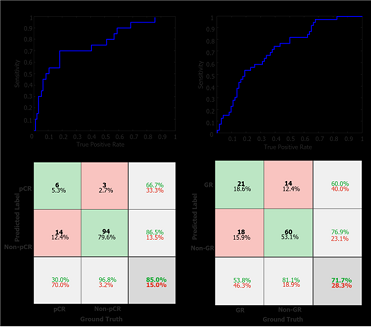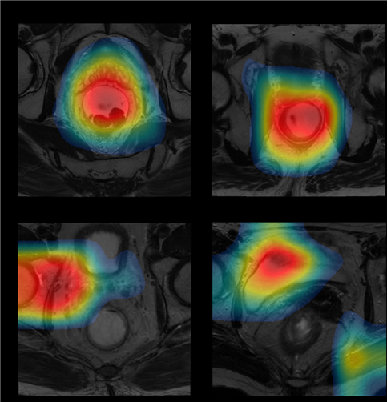글로벌 연구동향
방사선종양학
- 2021년 10월호
[Radiother Oncol.] Image-based deep learning model for predicting pathological response in rectal cancer using post-chemoradiotherapy magnetic resonance imaging 직장암의 항암방사선치료 반응 예측위한 MRI 영상기반 딥러닝 모델분당서울대병원 / 장범섭, 임유진, 이윤진*, 김재성*
- 출처
- Radiother Oncol.
- 등재일
- 2021 Aug
- 저널이슈번호
- 161:183-190. doi: 10.1016/j.radonc.2021.06.019. Epub 2021 Jun 15.
- 내용
-
Abstract
Introduction: To develop an image-based deep learning model for predicting pathological response in rectal cancer using post-chemoradiotherapy magnetic resonance (MR) imaging.Materials and methods: A total of 466 patients with locally advanced rectal cancer who received preoperative chemoradiotherapy followed by surgical resection were collected from single center, among whom 113 (24.3%) were allocated to the holdout testing set. Complete response (pCR) was defined as Dworak tumor regression grade (TRG) 4, while good response (GR) was defined as TRG 3 or 4. Based on post-chemoradiotherapy T2-weighted axial MR images, two deep learning models were developed to predict pCR and GR, respectively. The prediction performance of the deep learning models was evaluated in the testing set and was compared to that of a senior radiologist and a radiation oncologist.
Results: The deep learning model showed an area under the receiver operating characteristic curve, sensitivity, specificity, positive predictive value, negative predictive value, and accuracy of 0.76, 0.30, 0.96, 0.67, 0.87, and 85.0% for predicting pCR and 0.72, 0.54, 0.81, 0.60, 0.77, and 71.7% for predicting GR, respectively. The deep learning model had a superior predictive performance than the observers. Fair agreement between the ground truth and the model was shown for pCR prediction (kappa = 0.34) and GR prediction (kappa = 0.36).
Conclusions: The post-chemoradiotherapy T2-weighted axial MR image-based deep learning model showed acceptable performance in predicting pCR or GR in patients with rectal cancer, compared with human observers.

A. Complete response 예측 모델의 ROC 커브와 AUC 값
B. Good response 예측 모델의 ROC 커브와 AUC 값
C. 테스트셋 (N=113) 에서 Complete response 예측 모델의 Confusion matrix
D. 테스트셋 (N=113) 에서 Good response 예측 모델의 Confusion matrix

A. 정답을 맞춘 complete response 예측 모델의 Class activation map
B. 정답을 맞춘 good response 예측 모델의 Class activation map
C. 정답을 못 맞춘 complete response 예측 모델의 Class activation map
D. 정답을 못 맞춘 good response 예측 모델의 Class activation map
Affiliations
Bum-Sup Jang 1 , Yu Jin Lim 2 , Changhoon Song 1 , Seung Hyuck Jeon 3 , Keun-Wook Lee 4 , Sung-Bum Kang 5 , Yoon Jin Lee 6 , Jae-Sung Kim 7
1 Department of Radiation Oncology, Seoul National University College of Medicine, Seoul National University Bundang Hospital, Seongnam, Republic of Korea.
2 Department of Radiation Oncology, Kyung Hee University Medical Center, Kyung Hee University School of Medicine, Seoul, Republic of Korea.
3 Graduate School of Medical Science and Engineering, Korea Advanced Institute of Science and Technology, Daejeon, Republic of Korea.
4 Department of Internal Medicine, Seoul National University College of Medicine, Seoul National University Bundang Hospital, Seongnam, Republic of Korea.
5 Department of Surgery, Seoul National University College of Medicine, Seoul National University Bundang Hospital, Seongnam, Republic of Korea.
6 Department of Radiology, Seoul National University College of Medicine, Seoul National University Bundang Hospital, Seongnam, Republic of Korea. Electronic address: yoonjin319@gmail.com.
7 Department of Radiation Oncology, Seoul National University College of Medicine, Seoul National University Bundang Hospital, Seongnam, Republic of Korea. Electronic address: jskim@snubh.org.
- 키워드
- Concurrent chemoradiation; Deep learning; MRI; Rectal cancer; Transfer learning; Tumor regression.
- 연구소개
- Locally advanced rectal cancer 환자들의 항암방사선치료 후 병리학적 반응을 예측하는 것은 중요합니다. 여러 가지 임상적 요인들을 조합하여 예측하고는 있으나 이번에는 수술 전 T2-weighted MR 상에서 항암방사선치료의 반응성을 미리 예측할 수 있는지를 보고자 하였습니다. 예측할 수 있는 반응은 병리학적으로 complete response 와 good response로 나누어 딥러닝 모델을 학습시켰습니다. 그 결과 complete response를 예측하는 모델은 AUC 값이 0.76, good response를 예측하는 모델은 AUC 값이 0.72 라는 성능을 보였습니다. 뿐만 아니라 현재 현직에서 오래 영상판독을 하는 전문의 선생님도 초빙하여 그 성능을 비교하였는데, 결론적으로 비슷한 성능을 보였습니다. 이러한 모델은 앞으로 항암방사선치료 후 반응을 예측하고 관련 decision making process에 도움을 줄 것으로 됩니다.
- 덧글달기







